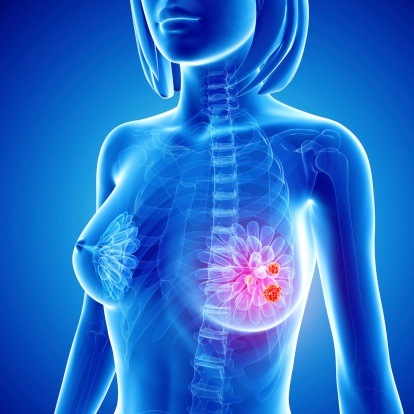
Researchers recently examined the correlation between circulating progesterone and breast cancer risk among postmenopausal women.
“Although it is well accepted that pharmacologic and physiologic concentrations of estradiol are associated with increased mitogenic activity of breast epithelial cells, the possible association with progesterone and breast cancer risk continues to be debated. Studies reporting increased breast cancer risk with menopausal hormone therapy use have primarily evaluated exogenous synthetic progestogen (progestin) use, rather than endogenous progesterone,” the researchers explained.
The study authors used a sensitive liquid chromatography–tandem mass spectrometry assay to quantify prediagnostic serum levels of progesterone and progesterone metabolites. The study population consisted of participants of the Breast and Bone Follow-up to the Fracture Intervention Trial (n=15,595). Eligible patients were those not receiving exogenous hormone therapy between 1992 and 1993, when blood sampling was conducted. Over a 12-month follow-up period, 405 cases of breast cancer were diagnosed; 495 postmenopausal women were randomly chosen within 10-year age and clinical center strata. The main exposures were circulating concentrations of pregnenolone, progesterone, and their major metabolites. The primary outcome was breast cancer development.
The present analysis included the 405 incident breast cancer cases and 495 postmenopausal women (mean age at time of blood draw, 67.2 years). Mean progesterone concentrations were 4.6 ng/dL. Breast cancer risk was higher among women with higher circulating progesterone levels per SD increase in progesterone levels (hazard ratio [HR]=1.16; 95% confidence interval [CI], 1.00 to 1.35; P=0.048). the researchers reported a linear association with progesterone, which was more pronounced for invasive breast cancers (n=267; HR=1.24; 95% CI, 1.07 to 1.43; P=0.004). Women in the lowest quintile (Q1) of circulating estradiol (<6.30 pg/mL) presented a correlation between elevated progesterone concentrations and reduced breast cancer risk per SD increase in progesterone levels (HR=0.38; 95% CI, 0.15 to 0.95; P=0.04); the risk was increased for women in higher estradiol quintiles (Q2 to Q5, ≥6.30 pg/mL; HR=1.18; 95% CI, 1.04 to 1.35; P=0.01; P=0.04 for interaction).
The results were published in JAMA Network Open.
“The possible identification of increased breast cancer risk with circulating levels of progesterone in postmenopausal women supports the need for additional research regarding its role in the cause of breast cancer overall and by tumor subtype. Further research is also needed to evaluate the role of progesterone metabolites and the interaction between progesterone and estradiol with breast cancer risk,” the study authors wrote in their conclusion.







 © 2025 Mashup Media, LLC, a Formedics Property. All Rights Reserved.
© 2025 Mashup Media, LLC, a Formedics Property. All Rights Reserved.